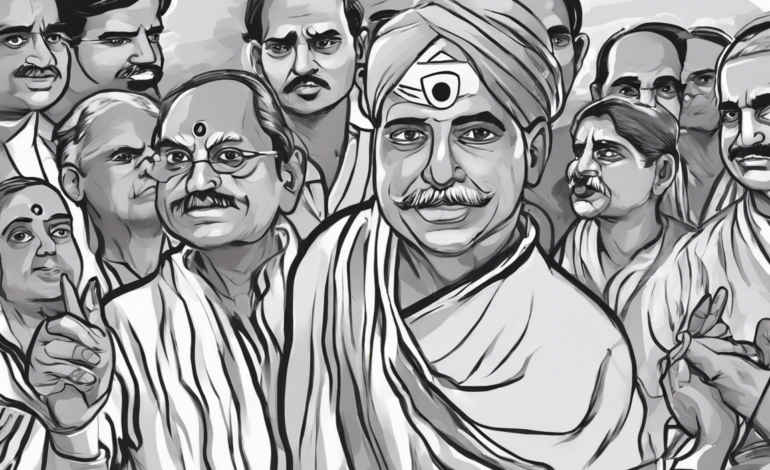
Exploring the Legacy of Janata Dal (Secular) – A Comprehensive Guide
Janata Dal (Secular), commonly known as JD(S), is a prominent political party in India with a rich history and a significant legacy. Founded in 1999 by former Prime Minister H.D. Deve Gowda, the party has had a considerable impact on the political landscape of the country, particularly in the southern state of Karnataka.
In this comprehensive guide, we will delve into the history, ideology, leadership, key accomplishments, and challenges faced by Janata Dal (Secular) over the years.
Origins and History
Janata Dal (Secular) was formed through the merger of the Janata Party with the Janata Dal, with the aim of providing a viable alternative to both the Indian National Congress and the Bharatiya Janata Party (BJP). The party draws its ideological roots from the principles of social justice, secularism, and federalism.
Although initially concentrated in Karnataka, JD(S) has expanded its presence to other states such as Kerala and parts of Telangana and Andhra Pradesh. It has participated in various coalition governments at the state and national levels, aligning with different political parties based on mutual interests and objectives.
Ideology and Vision
The ideology of Janata Dal (Secular) is based on the principles of democratic socialism, sustainable development, and inclusive growth. The party emphasizes the welfare of farmers, marginalized communities, and the economically backward sections of society.
Under the leadership of H.D. Deve Gowda and his son H.D. Kumaraswamy, JD(S) has advocated for a more decentralized and grassroots-oriented form of governance, prioritizing the needs of the common people over vested interests.
Leadership and Key Figures
H.D. Deve Gowda, a veteran politician and former Prime Minister of India, is considered the founding father of Janata Dal (Secular). His son, H.D. Kumaraswamy, has also played a pivotal role in shaping the party’s policies and strategies.
Other key figures within JD(S) include prominent leaders like H.D. Revanna, H.D. Balakrishna, and M.H. Ambareesh, who have contributed significantly to the party’s growth and influence in the region.
Key Accomplishments and Contributions
Over the years, Janata Dal (Secular) has made significant contributions to the socio-political landscape of Karnataka and India as a whole. Some of its key accomplishments include:
-
Farmers’ Welfare: JD(S) has been a strong advocate for farmers’ rights and has implemented various schemes and policies to support agricultural communities.
-
Infrastructure Development: The party has focused on infrastructural development in rural areas, improving connectivity, healthcare facilities, and educational institutions.
-
Social Welfare Programs: JD(S) has initiated several social welfare programs aimed at upliftment of backward classes, women, and marginalized communities.
-
Coalition Politics: By actively participating in coalition governments, JD(S) has played a crucial role in maintaining political stability and fostering consensus-based governance.
Challenges and Criticisms
Despite its achievements, Janata Dal (Secular) has also faced its share of challenges and criticisms. Some of the key issues include:
-
Leadership Transition: The party has been criticized for its family-centric leadership structure, which has led to concerns regarding succession planning and internal democracy.
-
Electoral Performance: JD(S) has struggled to expand its electoral base beyond Karnataka, facing challenges in gaining traction in other states and at the national level.
-
Internal Dissent: Like any political party, JD(S) has grappled with internal dissent and factionalism, which have at times hampered its cohesion and effectiveness.
-
Policy Consistency: Critics have questioned the party’s policy consistency and ideological clarity, suggesting a need for a more coherent and cohesive vision for the future.
Future Prospects and Strategic Priorities
Looking ahead, Janata Dal (Secular) faces a complex political landscape characterized by shifting alliances and emerging challenges. Some key strategic priorities for the party include:
-
Regional Expansion: JD(S) must focus on expanding its footprint beyond Karnataka, consolidating its presence in states where it has potential for growth.
-
Youth Engagement: The party needs to connect with younger voters and harness their energy and ideas to revitalize its leadership cadre and organizational structure.
-
Policy Innovation: JD(S) should prioritize policy innovation and adaptability, addressing contemporary issues such as climate change, technological disruption, and social inequality.
-
Alliance Building: Building strategic alliances with like-minded parties at the state and national levels will be crucial for JD(S) to maximize its influence and achieve its policy objectives.
Frequently Asked Questions (FAQs)
1. What are the core principles of Janata Dal (Secular)?
Janata Dal (Secular) is guided by the principles of democratic socialism, social justice, secularism, and federalism. The party emphasizes inclusive growth and sustainable development.
2. Who are the key leaders of JD(S)?
H.D. Deve Gowda, the former Prime Minister of India, is the founding leader of JD(S). His son, H.D. Kumaraswamy, has also played a significant role in shaping the party’s direction.
3. What is JD(S)’s stance on farmers’ welfare?
Janata Dal (Secular) has been a vocal advocate for farmers’ rights and has implemented various policies and schemes to support agricultural communities and address their concerns.
4. How has JD(S) contributed to infrastructure development in Karnataka?
The party has focused on improving infrastructure in rural areas, including better connectivity, healthcare facilities, and educational institutions to uplift the standard of living.
5. What are the key challenges faced by Janata Dal (Secular)?
Some of the challenges faced by JD(S) include leadership transition issues, electoral performance beyond Karnataka, internal dissent, and the need for greater policy consistency and clarity.
In conclusion, Janata Dal (Secular) remains a key player in Indian politics, with a legacy shaped by its commitment to social justice, grassroots empowerment, and coalition politics. As the party navigates the complexities of contemporary governance, its ability to innovate, collaborate, and adapt will be critical in securing its relevance and influence in the years to come.

